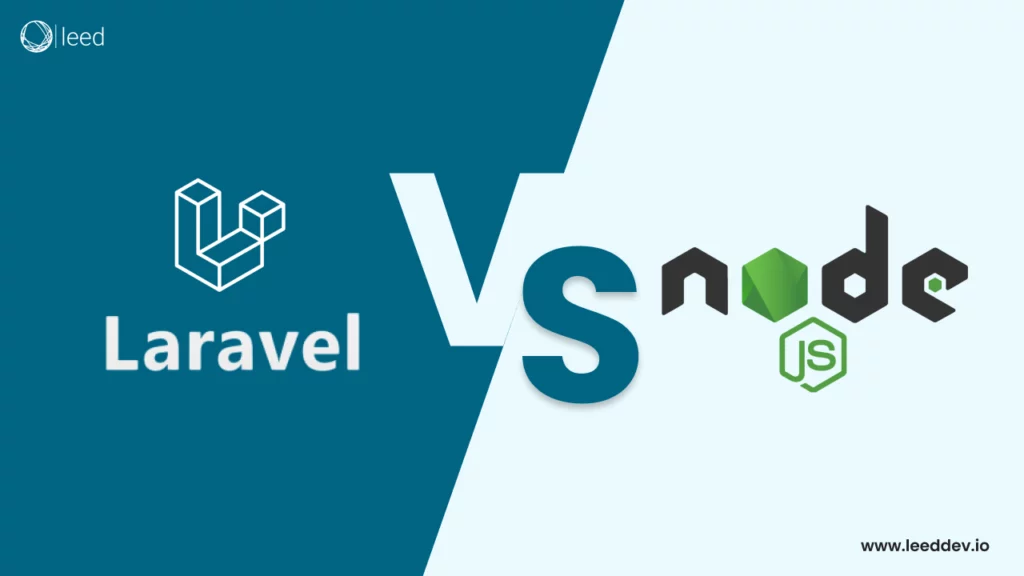Stuck choosing between Laravel and Node js? The right framework can make or break your project! Let’s explore what makes each unique and find the perfect match for your development needs.
Choosing between Laravel vs Node js can feel overwhelming but understanding their strengths makes it simpler. Laravel a PHP framework shines with its simplicity, elegance and built-in features like authentication, routing, and ORM perfect for structured web applications. On the other hand Node js a JavaScript runtime excels in non-blocking, event driven architectures making it ideal for real time apps and handling large concurrent connections.
Right choice depends on your project requirements, team expertise and scalability needs. Whether you’re building a traditional web app or a dynamic, real-time system, these frameworks offer robust solutions tailored to different goals.
What Is Laravel?
Laravel is PHP framework designed to simplify and enhance web development. Created by Taylor Otwell in 2011 and is known for developer friendly approach. It follows the MVC architecture ensuring clear code organization and easy maintenance. Laravel comes with powerful built-in tools like routing, authentication, caching and Eloquent ORM. It also features the Artisan command-line interface to automate repetitive tasks, saving time and boosting productivity. Laravel empowers developers to build everything from small websites to large scale apps.
Key Features of Laravel
Before discussing Laravel vs Node js leta discuss some of the main features of Laravel which are given below:
MVC Architecture
Laravel follows the Model-View-Controller architecture ensuring a clear separation of logic, data and presentation. This structure makes code more organized and maintainable. It enables faster development and scalability for complex applications.
Blade Templating Engine
Blade is Laravel’s lightweight and powerful templating engine. It simplifies the creation of dynamic views with reusable components and clean syntax. Blade templates are compiled into PHP for better performance.
Eloquent ORM
Laravel Eloquent ORM allows developers to interact with databases using PHP instead of SQL. It integrates with database tables by mapping models to them. This results in faster queries and improved application performance.
Authentication
Also provides a built-in authentication system for login, registration and role based access control. It is secure and easy to implement. Developers can quickly configure user authentication workflows.
Artisan Console
Artisan is Laravel’s command-line interface that automates repetitive programming tasks. It helps with database migrations, seeding, and generating boilerplate code. This tool enhances developer productivity significantly.
Security
Laravel offers advanced security features like hashed passwords, CSRF tokens & SQL injection prevention. It ensures that sensitive user data remains encrypted and secure. Security measures are built into the framework by default.
Routing
Laravel’s expressive routing system simplifies handling complex routes. Developers can define application routes using clean, readable syntax. This feature makes managing and scaling web applications easier.
Middleware
Middleware acts as a layer between HTTP requests and application logic. It allows tasks like authentication, logging, or filtering requests before they reach the core. This improves security and application flexibility.
Testing Support
Laravel includes tools for writing and running automated tests with ease. It supports PHPUnit out of the box for reliable testing. These features help ensure application stability and quality.
Task Scheduling
Laravel’s task scheduler enables automation of repetitive tasks like database cleanup or email notifications. This feature is integrated into Artisan commands for convenience. It simplifies routine application maintenance.
Database Migrations
Laravel migrations allow version control for database schema changes. They make it easy to modify and share schema updates across teams. Test data seeding is also supported for streamlined testing workflows.
Laravel Mix
Laravel Mix simplifies asset compilation and frontend management using Webpack. It supports CSS and JavaScript preprocessing and bundling. Developers can efficiently manage and optimize frontend assets
Companies that use Laravel
Some of the main companies which use Laravel are:
- TourRadar
- About You
- Pfizer
- Novell, Inc.
- Alpha Coders
- Laracasts
- Alison
- 9GAG
- BBC
- Invoice Ninja
Pros & Cons of Laravel
| Pros | Cons |
| Elegant syntax with MVC architecture | Steeper learning curve for beginners |
| Built-in authentication and security | Performance may lag for large-scale apps |
| Blade templating for clean, reusable views | Heavy reliance on server resources |
| Eloquent ORM simplifies database handling | Limited support for older PHP versions |
| Rich library ecosystem and Artisan CLI | Updates can occasionally break older code |
| Strong community support | Debugging can be challenging for complex apps |
| Easy integration with third-party tools | Overhead compared to lightweight frameworks |
What is Node.js?
Before discussing Laravel vs Node js we have discussed Laravel in detail. Time to know about Node.js. Node js is a runtime environment that enables JavaScript to run on the server side making it ideal for building high performance web apps. Introduced in 2009 by Ryan Dahl, it uses the powerful V8 JavaScript engine for fast execution.
Its non-blocking event-driven architecture allows efficient handling of multiple tasks simultaneously making it perfect for real time applications like chat apps and streaming services. With npm Node.js provides access to a vast ecosystem of modules, simplifying development.
Key Features of Node.js
Some of the main features of Node js are given below:
Asynchronous and Event Driven
Node js uses non-blocking APIs meaning the server doesn’t wait for tasks to complete before handling new requests. This makes it ideal for real time applications.
Full-Stack Development
Node.js allows developers to use JavaScript for both frontend and backend, making full-stack development easier. This improves coordination between the client and server for smoother applications.
Single-Threaded Architecture
Node operates on a single-threaded event loop, handling multiple requests efficiently without blocking. This scalability makes it suitable for high-traffic applications.
Cross-Platform Compatibility
Node js works on Windows, Linux, macOS and more. Developers can create apps that run across different platforms without rewriting code.
Fast Data Streaming
Node processes data in small chunks as it arrives, reducing buffering and ensuring efficient real-time data streaming for large-scale applications.
IoT Protocol Support
Node requires minimal resources and supports MQTT, enabling easy integration of multiple IoT devices. This makes it perfect for building connected systems.
Node Package Manager
npm offers a vast collection of open-source libraries, allowing developers to reuse code and speed up development. It simplifies dependency management too.
High Performance
Powered by Google’s V8 engine, Node translates JavaScript into machine code. Combined with non-blocking I/O, this ensures fast and efficient execution.
Scalability
Node’s event-driven model enables it to handle numerous concurrent connections. This makes it highly scalable for microservices and real-time systems.
Community Support
A large and active developer community provides tools, tutorials, and resources, driving continuous improvement and innovation in the Node.js ecosystem.
Companies that Use Node.js
Let’s take a look at some of the industry-leading companies that implement Node:
- Uber
- Netflix
- Airbnb
- PayPal
- Trello
- eBay
- Spotify
- Walmart
Pros & Cons of Node.js
| Pros | Cons |
| High performance with V8 engine | Callback hell due to nested asynchronous code |
| Full-stack JavaScript for frontend/backend | Limited library support for advanced tasks |
| Large npm ecosystem | Relatively young and evolving technology |
| Cross-platform compatibility | Not suitable for CPU-intensive applications |
| Highly scalable | Debugging and error handling can be complex |
| Strong community support | Learning curve for developers unfamiliar with async programming |
Difference Between Laravel vs Node js
Now coming back to the topic of Laravel vs Node js. Go through the table to know the main differences between Laravel vs Node js
| Features | Laravel | Node.js |
| Type | PHP-based web application framework | JavaScript runtime environment |
| Architecture | Follows MVC (Model-View-Controller) | Event-driven, non-blocking I/O model |
| Language | Uses PHP as the backend language | Uses JavaScript for both frontend and backend |
| Performance | Suitable for apps with complex business logic | Excels in handling real-time applications and high concurrency |
| Scalability | Moderately scalable, ideal for monolithic apps | Highly scalable for microservices and real-time applications |
| Database Interaction | Uses Eloquent ORM for seamless database operations | Database queries are written manually or with libraries like Sequelize |
| Package Management | Uses Composer for dependency management | Uses npm (Node Package Manager), the largest library ecosystem |
| Community Support | Large PHP developer community with extensive resources | Active JavaScript community with a wide range of contributors |
| Learning Curve | Easier for developers familiar with PHP | Steeper for backend beginners, requires knowledge of JavaScript |
| Use Cases | Best for CMS, eCommerce, and apps with heavy business logic | Ideal for real-time apps, chat apps, APIs, and IoT apps |
Laravel vs Node js Which is Better?
Both Laravel and Node.js offer unique strengths, and the choice depends on your project requirements. They both ensure accessible, secure, and scalable development, with advantages and trade-offs.
- Laravel: Ideal for traditional web apps, CMS, and e-commerce platforms with MVC architecture. It’s perfect for developers familiar with PHP and emphasizes rapid, structured development.
- Node.js: Best for real-time apps, APIs, and microservices needing high concurrency. Its asynchronous, non-blocking I/O model excels for chat apps, gaming platforms, and IoT projects.
Looking for a Development Partner?
At Leed Software Development we specialize in delivering tailored software solutions to meet your unique business needs. Whether it’s Laravel for structured web apps or Node js for real time systems our expert team ensures seamless development, scalability and innovation. Partner with us to turn your ideas into reality. Contact Now!
FAQs
What is Laravel best used for?
Laravel is ideal for traditional web apps, CMS, e-commerce platforms, and applications requiring MVC architecture.
What makes Node.js unique?
Node.js excels in building real-time apps, APIs, and systems with high concurrency due to its asynchronous, non-blocking I/O model.
Which is faster, Laravel or Node.js?
Node.js is generally faster for handling real-time and concurrent tasks, while Laravel is better for apps with complex business logic.
Can I use Laravel for real-time applications?
Yes, with tools like Laravel Echo and WebSockets, but Node.js is more suitable for real-time needs.
Which is easier to learn: Laravel or Node.js?
Laravel has a gentler learning curve for PHP developers, while Node.js requires JavaScript expertise.
What package manager does Laravel use?
Laravel uses Composer for dependency management.
Is Node.js suitable for large-scale apps?
Yes, Node.js is highly scalable and works well for microservices and IoT systems.
What kind of projects benefit from Laravel?
Laravel is great for projects that need structured development, like content-heavy websites and online stores.
Why choose Leed Software Development as a development partner?
Leed Software Development offers expertise in both Laravel and Node.js, ensuring your project is secure, scalable, and tailored to your needs.




